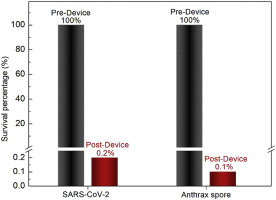July 8, 2020 -- New "catch and kill" air filters can instantly and efficiently kill SARS-CoV-2, the virus responsible for COVID-19. The details of the nickel foam-based prototype were published in Materials Today Physics on July 7.
The rapid spread of COVID-19 is related to SARS-CoV-2 carriers being highly infectious while asymptomatic and the ability of the virus to survive in various environmental conditions. Consensus indicates that the virus can be transmitted through aerosols and droplets that are released into the air by a carrier, especially when that individual coughs, sneezes, or talks forcefully in a closed environment. Previous studies have found that aerosolized particles containing SARS-CoV-2 can remain in the air for up to three hours and that droplets can remain on settled surfaces for several days.
Aerosolized SARS-CoV-2 in contained spaces
The possibility of aerosol transmission of SARS-CoV-2 through ventilation and central air conditioning systems is a growing concern as individuals return to work. With businesses reopening, the need to control the spread of the virus in air-conditioned spaces is urgent.
Researchers from the Texas Center for Superconductivity at the University of Houston were approached by Medistar, a Houston-based medical real estate development firm, on March 31 for help in developing the concept of a virus-trapping air filter.
Traditional air conditioner filters based on fiberglass or aluminum mesh are difficult to heat or have large pores that cannot catch and kill aerosolized viruses.
Understanding that the virus remains in the air for several hours, a new air filter needs to remove the virus from the air as quickly as possible. One way to achieve this is by heating the filter. SARS-CoV-2 cannot survive at higher temperatures and if a filter can be heated to a high temperature (up to 250° C), any SARS-CoV-2 in the cycling air could be efficiently killed in a very short time.
Nickel foam for filters
The University of Houston researchers suggested using nickel foam for the filters. This material meets several requirements, according the team. First it is porous, allowing for air flow. The nickel foam has randomly located pores that are between 50 µm and 500 µm in size and that meander from one side of the foam to the other. This large surface area can effectively catch particles in the air passing through the filter by van der Waals forces.
Second, the nickel foam is electrically conductive -- allowing it to be heated. Electrically heated materials are desirable for air-conditioning filters because they minimize the amount of heat that escapes from the filter, allowing the unit to function with minimal strain.
On the other hand, nickel foam has low resistivity, meaning it is difficult to raise the temperature of the material high enough to quickly kill the virus. Luckily, the nickel foam is a flexible material. So, the team folded the foam, connecting multiple compartments with electrical wires to increase the resistance high enough to raise the temperature to over 250° C.
Based on these design features, a prototype was built at a local workshop and subsequently tested at the Galveston National Laboratory.
Putting the filter to the test
The prototype demonstrated 99.8% viral load reduction from upstream to downstream using a single passthrough when the nickel foam filters were heated to 200° C. A median tissue culture infectious dose assay confirmed a viral titer reduction of SARS-CoV-2.

"This filter could be useful in airports and in airplanes, in office buildings, schools and cruise ships to stop the spread of COVID-19," said author Dr. Zhifeng Ren, PhD, Anderson Chair Professor of Physics at the University of Houston, in a statement. "Its ability to help control the spread of the virus could be very useful for society."
As a second test, the team also demonstrated that the filter was effective in neutralizing other bioterror threats, such as Bacillus anthracis (anthrax). The filter caught and killed 99.9% of anthrax spores in a similar experiment.
"This novel biodefense indoor air protection technology offers the first-in-line prevention against environmentally mediated transmission of airborne SARS-CoV-2 and will be on the forefront of technologies available to combat the current pandemic and any future airborne biothreats in indoor environments," said author Dr. Faisal Cheema at the University of Houston College of Medicine.
The researchers called for a phased rollout of the new device. They indicated that this should begin with high-priority venues such as schools, hospitals, healthcare facilities, and public transit where essential workers are at an elevated risk of exposure.
The new nickel filter could provide improved safety for front-line workers and allow nonessential workers to safely return to public workspaces.
Do you have a unique perspective on your research related to virology or materials science? Contact the editor today to learn more.
Copyright © 2020 scienceboard.net


